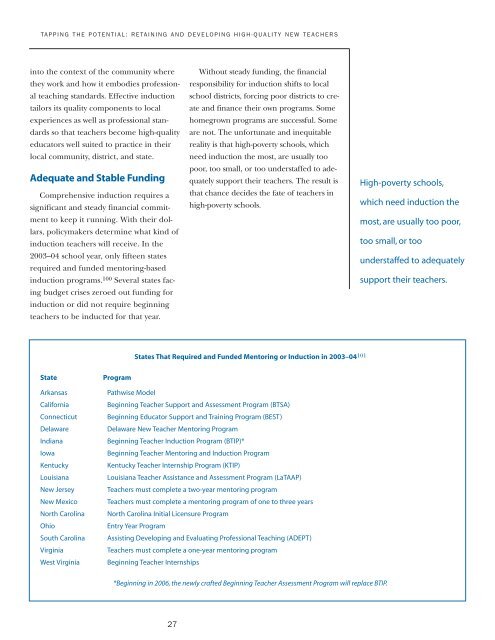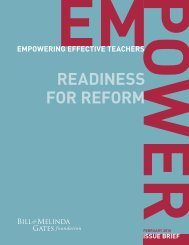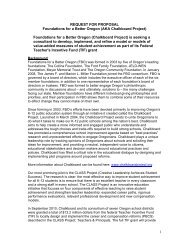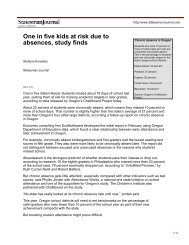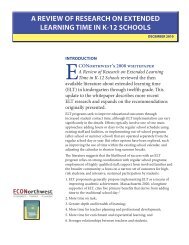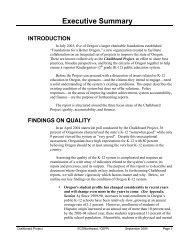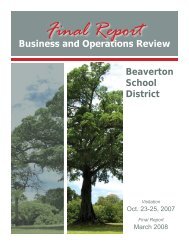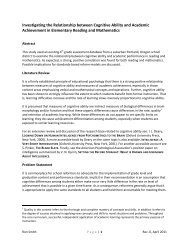Tapping the Potential - Alliance for Excellent Education
Tapping the Potential - Alliance for Excellent Education
Tapping the Potential - Alliance for Excellent Education
You also want an ePaper? Increase the reach of your titles
YUMPU automatically turns print PDFs into web optimized ePapers that Google loves.
TA P P I N G T H E P O T E N T I A L : R E TA I N I N G A N D D E V E L O P I N G H I G H - Q U A L I T Y N E W T E A C H E R Sinto <strong>the</strong> context of <strong>the</strong> community where<strong>the</strong>y work and how it embodies professionalteaching standards. Effective inductiontailors its quality components to localexperiences as well as professional standardsso that teachers become high-qualityeducators well suited to practice in <strong>the</strong>irlocal community, district, and state.Adequate and Stable FundingComprehensive induction requires asignificant and steady financial commitmentto keep it running. With <strong>the</strong>ir dollars,policymakers determine what kind ofinduction teachers will receive. In <strong>the</strong>2003–04 school year, only fifteen statesrequired and funded mentoring-basedinduction programs. 100 Several states facingbudget crises zeroed out funding <strong>for</strong>induction or did not require beginningteachers to be inducted <strong>for</strong> that year.Without steady funding, <strong>the</strong> financialresponsibility <strong>for</strong> induction shifts to localschool districts, <strong>for</strong>cing poor districts to createand finance <strong>the</strong>ir own programs. Somehomegrown programs are successful. Someare not. The un<strong>for</strong>tunate and inequitablereality is that high-poverty schools, whichneed induction <strong>the</strong> most, are usually toopoor, too small, or too understaffed to adequatelysupport <strong>the</strong>ir teachers. The result isthat chance decides <strong>the</strong> fate of teachers inhigh-poverty schools.High-poverty schools,which need induction <strong>the</strong>most, are usually too poor,too small, or toounderstaffed to adequatelysupport <strong>the</strong>ir teachers.States That Required and Funded Mentoring or Induction in 2003–04 101StateArkansasCali<strong>for</strong>niaConnecticutDelawareIndianaIowaKentuckyLouisianaNew JerseyNew MexicoNorth CarolinaOhioSouth CarolinaVirginiaWest VirginiaProgramPathwise ModelBeginning Teacher Support and Assessment Program (BTSA)Beginning Educator Support and Training Program (BEST)Delaware New Teacher Mentoring ProgramBeginning Teacher Induction Program (BTIP)*Beginning Teacher Mentoring and Induction ProgramKentucky Teacher Internship Program (KTIP)Louisiana Teacher Assistance and Assessment Program (LaTAAP)Teachers must complete a two-year mentoring programTeachers must complete a mentoring program of one to three yearsNorth Carolina Initial Licensure ProgramEntry Year ProgramAssisting Developing and Evaluating Professional Teaching (ADEPT)Teachers must complete a one-year mentoring programBeginning Teacher Internships*Beginning in 2006, <strong>the</strong> newly crafted Beginning Teacher Assessment Program will replace BTIP.27


